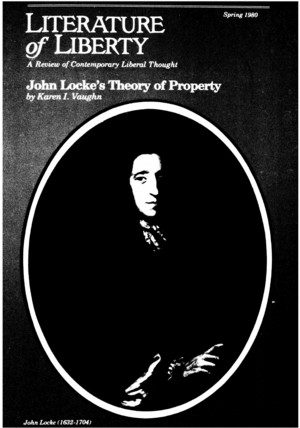
Part of: Literature of Liberty: A Review of Contemporary Liberal Thought Literature of Liberty, Spring 1980, vol. 3, No. 1
- Leonard P. Liggio (editor)
Literature of Liberty: A Review of Contemporary Liberal Thought was published by the Cato Institute (1978-1979) and later by the Institute for Humane Studies (1980-1982) under the direction of Leonard P. Liggio. It consisted of bibliographical essays, editorials, and shorter reviews of books and journal articles. There were 5 volumes and 20 issues. This issue contains an essay by Karen I. Vaughn on “John Locke’s Theory of Property: Problems of Interpretation.”